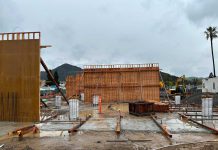A series of housing laws signed by Gov. Gavin Newsom in recent memory has prompted an organized group of city officials from throughout the state to gather signatures for an initiative they say will help bring land-use decisions back to local jurisdictions.
The “Our Neighborhood Voices” initiative, which includes endorsements from some South County officials, seeks to amend the California Constitution to allow local land-use and zoning laws to override conflicting state laws.
Proponents are targeting laws such as Senate Bill 9, signed by Newsom in September and which took effect Jan. 1, which allows for a property zoned single-family to be split for a duplex without a public hearing, if it meets various requirements.
Senate Bill 10, which also took effect Jan. 1, allows any parcel to be zoned for up to 10 residential units if it is located in “transit-rich” areas or is considered an urban infill.
Supporters must collect just shy of one million signatures in order for the initiative to be placed on the November ballot.
Morgan Hill City Councilmember Rene Spring is listed on the initiative’s website as a supporter. Spring said recent state laws designed to resolve the housing crisis have so far failed to do so, while stripping Morgan Hill of its local control over housing development. The city’s voter-approved Residential Development Control System, which has been in place since the 1970s, has been effectively canceled by these state laws since 2020—already resulting in vast changes in the city’s new housing trends.
“We need local control to get handed from the state level back to our communities,” Spring said. “This is a strong reason for me to support this initiative. So far, these newer state housing laws enacted have not solved the housing crisis (or) made homes more affordable. Most new homes built in our city (unless the 100% affordable ones) still are far out of reach for most people and just put money into the pockets of market rate developers as some of us had warned about early on when I spoke up in strong opposition of SB35, SB330, SB9 and SB10 and other state housing bills.”
The Gilroy City Council voted 5-1 on Dec. 6 to endorse the initiative, with Councilmember Zach Hilton dissenting and Councilmember Rebeca Armendariz absent.
Councilmember Carol Marques, who is taking the lead on the signature-gathering in Gilroy, said the city was approached by Redondo Beach Mayor Bill Brand, an initiative proponent, to join the organized effort to “bring back local control.”
“The whole premise behind Our Neighborhood Voices is that residents should have a voice on how their cities are going to look and how their neighborhood is going to look,” she said. “We want Sacramento to listen to what the people are saying.”
The four-page text of the initiative states that “Community development should not be controlled by state planners, but by local governments that know and can address the needs of, and the impacts upon, local communities.”
Marques said Gilroy’s 2040 General Plan, which outlines land use for the next 20 years, was the result of many years of work. Such state housing laws endanger that planning, she noted.
“This is not one size fits all cities,” she said. “What’s good for San Francisco and Los Angeles might not be good for smaller cities.”
Hilton, meanwhile, said some local control has been taken away “because elected leaders of the past have failed to listen to the needs of all their constituents.”
“Gilroy City Councils of the past have never addressed the shortage of affordable housing through meaningful policy changes,” he said. “That has resulted in increased homelessness and contributed to the racial wealth inequality of our community.”
Hilton added that some supporters of the initiative are resorting to “fear messaging,” telling people that single-family lots can be split into fourplexes, “which is not true.”
“SB9 is a duplex bill with tenant protections,” he said. “We have objective design standards that are meant to create a human-scale environment and buildings that are compatible with and enhance the surrounding area. We should be focusing on creative ways for housing all generations, while breaking down barriers to renters and home ownership.”
Marques said the initiative is not against housing, but rather, “planned growth” with “well thought out housing.”
Spring added that one reason the recent state housing laws are ineffective is they are not supported by funding from the state to improve transportation, water and sewer infrastructure, or hire more city staff to handle the increase in new residents.
“I encourage all of our residents to educate themselves about this initiative and to sign it now if they agree with its goals,” Spring added.
The Morgan Hill City Council was slated to consider endorsing the initiative on its Jan. 19 agenda. But the item was continued to a future meeting, with some councilmembers saying they needed more information first.
“As promising as it looks, and it could be the panacea to all of our woes, it’s just too vague,” Councilmember John McKay said, suggesting the council revisit the item once it receives clarity from the League of California Cities or city staff.
In addition to Brand, the initiative’s proponents are United Homeowners’ Association co-founder John Heath, Yorba Linda Mayor Peggy Huang, Brentwood City Councilmember Jovita Mendoza and former San Francisco Planning Commissioner Dennis Richards.
Major financial contributors to the initiative include $200,000 from Alameda retiree Reyla Graber, who has contributed to many Democratic candidate campaigns over the years, $50,000 from the AIDS Healthcare Foundation in Los Angeles, and $10,000 from Dallas, Texas-based Roven Productions Inc.
An excerpt from the Our Neighborhood Voices initiative (from ourneighborhoodvoices.com) follows:
PROVIDES THAT LOCAL LAND-USE AND ZONING LAWS OVERRIDE CONFLICTING STATE LAWS. INITIATIVE CONSTITUTIONAL AMENDMENT. Provides that city and county land-use and zoning laws (including local housing laws) override all conflicting state laws, except in certain circumstances related to three areas of statewide concern: (1) the California Coastal Act of 1976; (2) siting of power plants; or (3) development of water, communication, or transportation infrastructure projects. Prevents state legislature and local legislative bodies from passing laws invalidating voter-approved local land-use or zoning initiatives. Prohibits state from changing, granting, or denying funding to local governments based on their implementation of this measure. Summary of estimate by Legislative Analyst and Director of Finance of fiscal impact on state and local governments: Fiscal effects of the measure depend on future decisions by the cities and counties and therefore are unknown.








